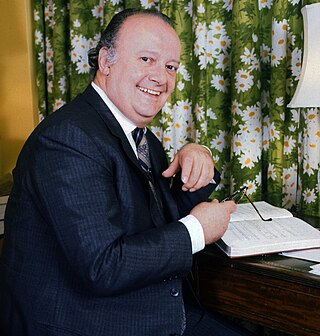
Lorin Varencove Maazel was an American conductor, violinist and composer. He began conducting at the age of eight and by 1953 had decided to pursue a career in music. He had established a reputation in the concert halls of Europe by 1960 but, by comparison, his career in the U.S. progressed far more slowly. He served as music director of The Cleveland Orchestra, Orchestre National de France, Pittsburgh Symphony Orchestra, Bavarian Radio Symphony Orchestra, and the New York Philharmonic, among other posts. Maazel was well-regarded in baton technique and possessed a photographic memory for scores. Described as mercurial and forbidding in rehearsal, he mellowed in old age.

Tito Gobbi was an Italian operatic baritone with an international reputation.

Sir Geraint Llewellyn Evans CBE was a Welsh bass-baritone noted for operatic roles including Figaro in Le nozze di Figaro, Papageno in Die Zauberflöte, and the title role in Wozzeck. Evans was especially acclaimed for his performances in the title role of Verdi's Falstaff. He sang more than 70 different roles in a career that lasted from his first appearance at Covent Garden in 1948 to his farewell there in 1984.
Joseph, Baron Van Damme, known as José van Dam, is a Belgian bass-baritone, described as having "a magnificent resonant and expressive voice" and being "an excellent actor".
Sir Simon Keenlyside is a British baritone who has performed in operas and concerts since the mid-1980s.

The Royal Opera is a British opera company based in central London, resident at the Royal Opera House in Covent Garden. Along with English National Opera, it is one of the two principal opera companies in London. Founded in 1946 as the Covent Garden Opera Company, the company had that title until 1968. It brought a long annual season and consistent management to a house that had previously hosted short seasons under a series of impresarios. Since its inception, it has shared the Royal Opera House with the dance company now known as The Royal Ballet.
Sir Willard Wentworth White, OM, CBE is a Jamaican-born British operatic bass baritone.
The Tempest is an opera by English composer Thomas Adès with a libretto in English by Meredith Oakes based on the play The Tempest by William Shakespeare.
George Orwell's 1949 dystopian political novel Nineteen Eighty-Four, has been adapted for the cinema, radio, television, theatre, opera and ballet.

Hamlet is a grand opera in five acts of 1868 by the French composer Ambroise Thomas, with a libretto by Michel Carré and Jules Barbier based on a French adaptation by Alexandre Dumas, père, and Paul Meurice of William Shakespeare's play Hamlet.

Un re in ascolto is an opera by Luciano Berio, who also wrote the Italian libretto. It is based on a short story from the collection Under the Jaguar Sun by Italo Calvino, but incorporates excerpts from Friedrich Einsiedel's 1778 libretto for an opera based on Shakespeare's The Tempest. This became Die Geisterinsel in 1798, set to music written by Friedrich Fleischmann. In addition, W. H. Auden's The Sea and the Mirror: A Commentary on Shakespeare's The Tempest was a source.

Joan Pons Álvarez is a Spanish operatic baritone, known internationally as Juan Pons. He is most famous for his Verdi roles.

Diana Damrau is a German soprano who achieved international fame for her performances, primarily in opera, but also in concert and lieder. She has been successful in coloratura soprano roles since her early career, and gradually proceeded into heavier roles of the 19th-century Italian bel canto repertoire. Her signature roles include the Queen of the Night in The Magic Flute, Zerbinetta in Ariadne auf Naxos, Lucia in Lucia di Lammermoor, and Violetta in La traviata.
August Everding was a German opera director and administrator.
Éva Marton is a Hungarian dramatic soprano, particularly known for her operatic portrayals of Puccini's Turandot and Tosca, and Wagnerian roles.

Lawrence Brownlee is an American operatic tenor particularly associated with the bel canto repertoire. Describing his voice, Speight Jenkins, general director of the Seattle Opera, said: "There are other singers that sing this repertory very well, but I don't think anyone else has quite as beautiful a sound and as rounded a tone," and praise his "incredible top notes", adding about his high F (F5) in "Credeasi, misera": "With him it's not a scream, it's a beautiful sound." Mezzo-soprano Joyce DiDonato adds: "He is always in service of the music. His natural instrument is just incredibly beautiful. The word 'honey' comes to mind. He also has technical prowess and agility."
Andrew Shore, is an English operatic baritone.
Noah Stewart is an American operatic tenor. He released his debut album, Noah, in March 2012; it peaked at number 14 on the UK Albums Chart and number 1 on the UK Classical Album Chart.

Svetla Vassileva is a Bulgarian opera singer (soprano).
Lillian Watson, born 4 December 1947 in London, is a soprano whose international career on the concert stage and in the opera house took her to theatres and venues around the UK and throughout Europe; she also made a number of recordings of parts of her repertoire and appeared on film.










